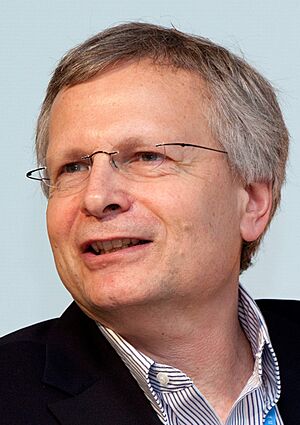Dani Rodrik facts for kids
Quick facts for kids
Dani Rodrik
|
|
|---|---|

Rodrik (2012)
|
|
| Born | August 14, 1957 Istanbul, Turkey
|
| Citizenship | Turkish |
| Institution | Institute for Advanced Study |
| Field | International economics, economic development, political economy |
| Alma mater | Robert College Princeton University (PhD, MPA) Harvard University (AB) |
| Doctoral advisor |
Avinash Dixit |
| Awards | Leontief Prize for Advancing the Frontiers of Economic Thought (2002) |
| Information at IDEAS / RePEc | |
Dani Rodrik (born August 14, 1957) is a well-known Turkish economist. He is a professor at the John F. Kennedy School of Government at Harvard University. He teaches about how countries interact in the world economy. Before Harvard, he was a professor at the Institute for Advanced Study in Princeton, New Jersey.
Professor Rodrik has written many articles and books. His work focuses on international economics, how countries grow and develop, and how politics affects the economy. He often asks why some governments are better at making good economic choices than others. His famous books include Economics Rules and The Globalization Paradox. He also helps edit an academic journal called Global Policy.
Contents
About Dani Rodrik
Dani Rodrik comes from a family of Sephardic Jews. He grew up in Istanbul, Turkey.
His Education and Early Career
He went to Robert College in Istanbul. After that, he studied at Harvard College, where he earned a degree in Government and Economics in 1979. He then went to Princeton University. There, he earned two more degrees: a Master's in Public Administration in 1981 and a PhD in Economics in 1985. His PhD research was about trade and exchange rates.
In 2011, he joined the executive committee of the World Economics Association. This is a group for economists around the world. He is married to Pınar Doğan, who also teaches at the Harvard Kennedy School.
Awards and Recognition
Dani Rodrik is connected with several important research groups. These include the National Bureau of Economic Research and the Centre for Economic Policy Research. He has received money for his research from big foundations like the Carnegie Corporation and the Ford Foundation.
In 2002, he won the Leontief Prize. This award is given to economists who make important contributions to economic thought. In 2019, he received an honorary doctorate from Erasmus University Rotterdam in the Netherlands. In 2020, Pope Francis named him a member of the Pontifical Academy of Social Sciences. This academy advises on social issues.
Dani Rodrik's Ideas and Books
Dani Rodrik writes a lot about how the global economy works. He explores the challenges and benefits of countries becoming more connected.
Understanding Globalization
In his 1997 book, Has Globalization Gone Too Far?, he talked about the challenges of globalization. Globalization means countries are more connected through trade and shared ideas. He explained that while globalization can help some countries, it can also create problems. It can make it harder for some countries or groups of people to keep up. He pointed out that free markets can sometimes cause social problems if not managed carefully.
In 2000, he came up with the idea of the "political trilemma of the world economy." This idea suggests that countries can only have two of these three things at once: deep economic globalization, national independence, and democratic politics. It's hard to have all three at the same time.
Current Work and Contributions
Since 1998, Dani Rodrik has been a regular writer for Project Syndicate. This is a platform where experts share their ideas on global issues. In 2019, he also helped start a group called Economics for Inclusive Prosperity (EfIP). This group aims to promote economic ideas that help everyone in society, not just a few.
See also
 In Spanish: Dani Rodrik para niños
In Spanish: Dani Rodrik para niños
 | Madam C. J. Walker |
 | Janet Emerson Bashen |
 | Annie Turnbo Malone |
 | Maggie L. Walker |

